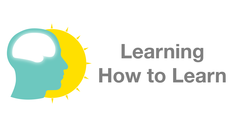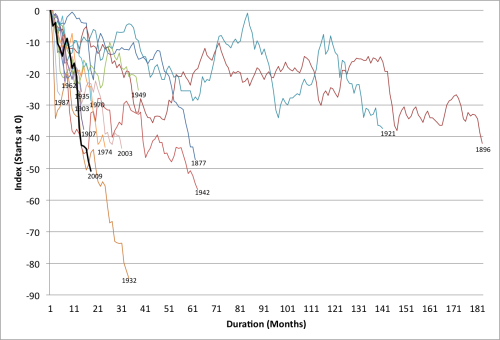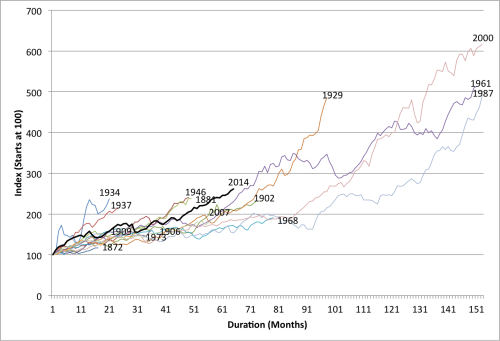
Solution to Earnings Quality Case Study (Manufactured Housing)
The case was introduced here:http://wp.me/p2OaYY-1y8. Try it now if you haven’t. What jumps out at you? Red flags should be flying when you read the chilling lines (at the bottom of this post so as to not give you the answer now.)
Stirling Momex Supplement and Enron Too Shall Pass and GAAP Games_Stirling Homex
Learn more about reading Hayek. What books you should focus on: http://www.econtalk.org/archives/2012/12/boudreaux_on_re.html
http://www.econlib.org/library/Topics/Guides/TenKeyIdeas.html
How to learn (Refine your questions)
Learning Begins From Within
by Butler Shaffer
Don’t ever let school interfere with your education.~ Mark Twain
Education is an ongoing confrontation between those who want to help children learn how to think, and those who want to teach them what to think. While there are numerous variations on these themes, the contrast can most clearly be found in the distinctions between child-centered Montessori systems, and teacher- and test-centered schools. Government schools usually fall into the latter category. Homeschooling, religious schools, un-schooling, and other forms tend to emphasize either the “how” or the “what” in their efforts with children.
Those who focus on learning how to think have in mind helping children develop their own methods of questioning and analyzing the world around them; to control their own inquiries and opinions; to the end of helping children become independent, self-directed persons. The role of the teacher in such a setting is to provide new learning situations (e.g., open up new subjects of inquiry when the student is ready to do so) and to facilitate the processes of questioning so as to help the students get to deeper levels of understanding.
People who have developed the capacity for epistemological independence are not easy to control for purposes that do not serve their interests. Institutions – which have purposes of their own that transcend those of individuals – require a mass-minded population that has been conditioned to accept outer-imposed definitions of “reality.” Any deviation from this systemic purpose – as would derive from students questioning how the arrangement would benefit them – would be fatal to all forms of institutionalism.
The established order has, from one culture and time period to another, insisted on educational systems that train young minds into what to think. “Truth” becomes a set of beliefs that conform to an institutional imperative, and it becomes the purpose of schools to inculcate such a mindset. Whereas “how to think” learning that finds its purpose and focus within the minds of self-directed, independent students, “what to think” education derives from outside the students’ experiences and analytical skills. As Ivan Illich so perceptively expressed it, “[s]chool is the advertising agency which makes you believe that you need the society as it is.”
To this end, the established order has helped generate – with eager assistance from academia – a belief that all understanding is a quality requiring phalanxes of self-styled “experts” who, by virtue of their prescribed status, enjoy monopolies to offer opinions about their respective fields of study. Plato’s designation of “philosopher kings” has been sub-franchised into categories of “experts” to be found in “history,” “physics,” “psychology,” “economics,” “law,” and seemingly endless sub-groupings that negate the role once respected for those who had received a “liberal arts” education.
Entry into the sanctum sanctorum of the upper floors of this pyramidal high-rise is determined by a process of certification usually reflected in a graduate school degree provided by those already recognized. Of course, given the logic of any vertically-structured system, there is a hierarchy of certifying agencies, wherein Ivy League universities are presumed more capable of identifying and recognizing expert genius, than would Boll Weevil State University. Nor is tolerance exhibited toward any interloper who might dare to offer an opinion outside his or her area of certification. (When my book, In Restraint of Trade was first published some fifteen years ago, one reviewer – from a history department at a highly-respected university – spent the bulk of his time criticizing not the substance of my book, but the fact that I taught in a law school!)
The assumption is often expressed that, in a complicated world we must rely on “experts” to navigate through the turbulence and uncertainties that abound. But the study of “chaos” and “complexity” challenge this thinking, reminding us that complex systems produce unpredictable outcomes; that the most effective action occurs when decision-making is decentralized closest to the source of such turbulence. In a world currently being destroyed by centralized state systems of “economic planning,” “military planning,” misnomered “intelligence agencies,” “health-care planning,” among others, it is increasingly evident to people that the certified “experts” tend to supply answers to problems that their epistemological arrogance has helped to generate.
Systems premised upon outer- rather than inner-directed learning – training students what to think rather than how to think – turn children’s minds into so much “mush” as to deplete their inherent creative energies. People become neutralized by a system that trains them to accept the inadequacy of their own minds to make empirical and analytical judgments about the world. The outer-directed approach, in which “truth” is presumed to be found within the opinions of the certified intelligentsia, is self-sustaining as long as students’ minds remain in the default mode. Expertism is a circular process that makes it difficult for people to break the circle unless they have a sufficiently independent mind.
The method of learning I have found essential for encouraging the inner-directed (i.e., how to think) approach is found in the use of the Socratic method, which used to be used in most law schools. My all-time favorite professor was Malcolm Sharp, a law professor at the University of Chicago, one of the loveliest persons I have ever known; but who frustrated most of his students with his insistence on getting us to keep refining the quality of our questions. This was done through an ever-deepening level of inquiry encouraged by the creative us of the word “why?”
To the proposition “government is necessary in order to protect the lives, property, and liberty of people” the following questions could be asked: “how is property being protected if the state must forcibly take property from people (taxation) in order to support its activities?” “Can liberty be protected if the state can compel people to act – or refrain from acting – in ways contrary to how they would otherwise choose to behave?” “How can lives be protected if the state is able to engage in deadly wars?” “If the war system generates restrictions on human action, including the forced conscription of people as soldiers, how is individual liberty being defended?” “If it is our purpose to protect the lives, liberty, and property of people, can such ends be served by a system that regularly contradicts such ends? Are there alternative ways to accomplish such purposes?” As each question is asked, the response might generate additional sub-questions to be explored (e.g., is it possible to support a system through voluntary payments? Is the marketplace an example of accomplishing these ends without violating them in the process?)
Most of my students experience frustration over my methods of providing them with cases and materials, and then playing around with hypotheticals – and the factual modification of hypotheticals – to explore the ramification of case holdings and rules of law. “I came to law school to get answers, one student raged, and all you’re giving me is more questions!” “How do you propose to deal with legal questions once you are in practice?” I asked him. “And if you think I am such a fount of understanding, how do you think I got that way; and do you think you might be able to develop such a skill?” It is encouraging to find some students who grasp, at the outset, that their success in the classroom and as lawyers depends upon this process of learning how to think. I often receive favorable responses from students years later. I had one student tell me “when I was a student of yours, I hated your guts. Now that I’ve been out in practice for ten years, I think I learned more from you than from anyone else.” Just a few months ago, a former student wrote me – thirteen years after graduation – to thank me for what she learned from my classes.
Perhaps the most pleasant experience I had with a first-year law student came on the first day of class a few years ago. We had discussed a particular case, and I began playing around with the facts to see how the students might follow the process of discovering the boundaries of legal concepts. At this stage, most students are able to give a one-line answer, but can go no further. This young woman, however, took the inquiry to greater depths: “how does this square with what the court said in the earlier case?,” and similar inquiries. I knew, at once, that she was a real “keeper;” that classes were going to be far more interesting with her ability to use the Socratic process to discover the kind of understanding one never gets from answers; that it is the endless pursuit and improvement of one’s questions that makes for real learning.
I asked this young woman about her educational background: “I was homeschooled up to high school,” she responded. “The best teachers I ever had were my parents.” I suspect that she was the beneficiary of parents who knew that how to think was of greater importance to a creative and successful life, than being conditioned into what to think! The former approach allows men and women to develop, within their own minds, the skills not only for understanding the nature of the world, but to act competently. The latter method reduces people to the task of seeking the opinions of others – particularly the “experts” – to be informed of what they are expected to know.
After working through a series of hypotheticals, I still get a few students who ask “but what is the answer?” “Who cares?,” I respond. “It is going through the process of constant questioning that is the purpose of what we are doing here? I don’t know how the courts would rule in this situation, but I do know what noises to make were I representing one of the parties.” The Socratic method helps students grasp the meaning of Milton Mayer’s observation that “the questions that can be answered aren’t worth asking.”
Our world is being torn apart by men and women who naively try to integrate into some manageable whole their confusions, contradictions, conflicts, lies, evasions, corrupt and violent dispositions, and other destructive behavior. We live at a time when people become righteously indignant over the heinous murder of another, but wave flags and cheer for those who conduct wars against the millions; when Nobel Peace Prize grantors cannot distinguish Mother Theresa from Henry Kissinger as worthy recipients of such an award. Perhaps when our well-organized, expertly-run world finally runs out of answers to the destructive conditions it has created, we may – as Malcolm Sharp urged – undertake the search for improved questions.
December 12, 2012
Copyright © 2012 by LewRockwell.com. Permission to reprint in whole or in part is gladly granted, provided full credit is given.
Butler Shaffer Archives
RED FLAG on Earnings Quality Case Study (Thanks to a reader)
Note 3 on receivables says revenues are recognized when units are
manufactured and assigned [at the company’s discretion] to specific
contracts. (What the F%^&!) Then it says contracts provide for payment upon completion. (Expect a massive difference between GAAP accruals and CASH FLOW–lots of room for funny stuff!)
[not manufacture/assignment] and receipt of all approvals necessary
[which is not in Homex’s control]… Ergo revenues are booked when the
customer doesn’t even have to pay. BINGO!
That note to the financials (Revenue Recognition) should have you reaching for the barf bag.
LESSON: READ THE NOTES TO THE FINANCIALS!

















